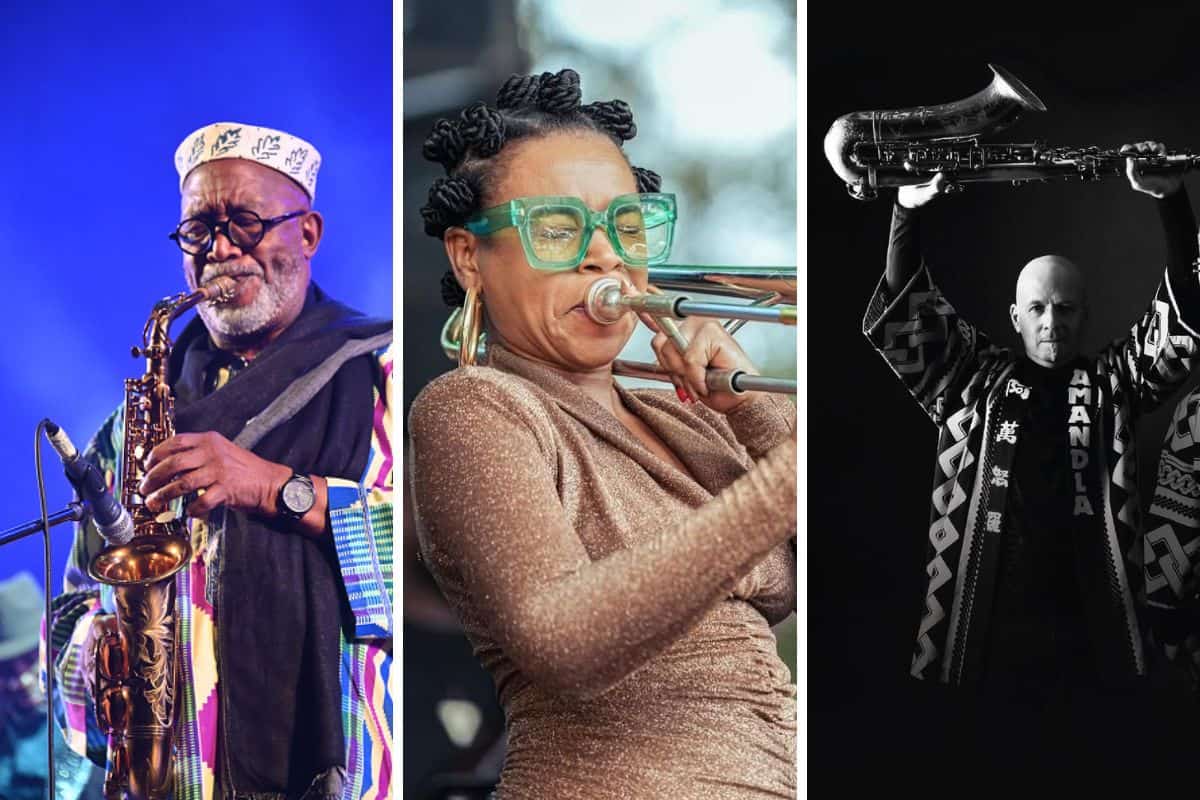
Migration has defined humanity for as long as people have walked the earth.
It is a constant force that shapes human populations, cultures and societies, driven by humanity’s core desire for better opportunities and resources.
South Africa’s long-standing Jazz festival, the Standard Bank Joy of Jazz, has also partly been defined by migration in its 28 years.
First hosted at the State Theatre in Pretoria in 1997, the music festival relocated to Newtown’s art precinct in 2000 and then moved to its current venue, the Sandton Convention Centre, in 2014.
The festival was founded by Peter Tladi through his artist management and promotions company, T-Musicman.
“The move to the Sandton Convention Centre has multiple benefits,” Tladi said in 2014.
“It allows us to grow, to sell a full festival pass as well as to improve sound, staging, security and parking. We are no longer at the mercy of the weather.”
Initially, the move to Sandton was intended to last for five years. However, it has now been more than a decade and the festival has not looked back.
ALSO READ: Joy of Jazz: The ‘Black Jew’ driving force behind music festival
The Joy of Jazz’s migration
Initially, with the move to Sandton there was a sense that the festival was losing its soul, having been hosted in Newtown and the Market Theatre for over a decade.
“When it moved from Newtown, I may feel a bit biased towards the other sentiments people were feeling,” Sipho “Hotstix” Mabuse tells The Citizen.
“Because I really felt for Kippies and inadvertently, many of us who had restaurants and jazz clubs near the Market Theatre, benefited from the Standard Bank Joy of Jazz. Because it [Newtown] was a cultural precinct, we thought that place was perfect for it [the Joy of Jazz].”
Despite his romanticism of Newtown as the spiritual home of South African jazz, Mabuse acknowledges the economics behind the move.
“Considering the festival has grown in leaps and bounds, as to whether the Market Theatre precinct was capable of sustaining economically the Joy of Jazz. It was a Catch-22 situation,” says the multi-instrumentalist.
“I think the passion to keep it at the precinct was still there. However, the economics determination made him [Peter Tladi] decide well. For us to be able to keep it successful, Joy of Jazz needed the Sandton Convention Centre.”
Having performed at multiple editions of the Joy of Jazz, Mabuse says he has seen the benefit of the move in terms of growth in numbers.
For trombonist, singer and composer Siya Makuzeni, who made her debut as an 18-year-old matriculant as part of the National Youth Big Band in 2000 in Newtown, there are some distinct disparities between the venues.
“I think what I miss about Newtown is its ease of sort of flow between the stages. In a sense that didn’t feel so overwhelming. Something about the ccnvention Centre makes it very claustrophobic, for lack of a better word,” she tell The Citizen.
Saxophonist and flautist Steve Dyer echoes Mabuse about the logistical and financial benefits of the move.
“I do realise and I remember when the festival was taken to Sandton Convention Centre, people were saying ‘why are you taking it out the heart of Johannesburg’ but possibly in terms of organization and logistics, it was easier to do it at the Sandton Convention Centre,” Dyer tells The Citizen.
He acknowledges some of the difficulties of navigating the various stages on different levels of the centre.
ALSO READ: Feeling the groove at the Standard Bank Joy of Jazz
The First Joy of Jazz
Mabuse is one of the few artists who have performed at all three venues.
Not only was he on the first Joy of Jazz line-up, but Mabuse describes himself as one of the founders of the festival.
“I’ve always had a relationship with Peter Tladi. My relationship with him goes way before the Joy of Jazz. He was someone that used to promote Harari,” says the former Harari drummer.
“So perhaps that might be the reason for him to invite me as one of those acts.”
Dyer, though he never performed at the inaugural festival, recalls the buzz around it when it was launched.
“The growth has been really quite spectacular. I can remember in Pretoria even though I wasn’t there, my sound engineer just calling me when he was doing something at the Rendezvous at State Theatre.”
“So, from very small beginnings it’s come to be a major festival.”
Makuzeni, who started her journey with the Joy of Jazz at a young age, says the festival has been a space for her and others to create a career.
“The Joy of Jazz pretty much has gained a lot of weight with regards to being a proper voice for jazz musicians, particularly those who have a lens which is really traditional. It’s definitely become a global scale and that’s the growth I’ve seen.”
The 75-year-old Tladi is no longer as involved in the day-to-day organising as he was, as Mantwa Chinoamadi is the festival producer.
Speaking to The Citizen earlier this year, Chinoamadi discussed how the Joy of Jazz has contributed to a tourism boom for Joburg.
She said the Joy of Jazz provides packages to tourists wishing to travel to South Africa to attend the festival.
“We have been blessed to consistently showcase the best in-class jazz and lifestyle from South Africa and the world.
“It underscores the festival – not only as a premier jazz event on the African continent – but as a destination event that also drives economic and cultural development in the city and the region,” she said.
ALSO READ: Niki’s Oasis Jazz Restaurant: a home for Joburg’s jazz lovers for three decades
All for the jazz
Despite its changes in location over the years, what has remained constant with the Joy of Jazz is its unwavering dedication to the genre.
While its closest competitor in the music festival arena in South Africa, the Cape Town International Jazz Festival, has waned over the years to the point of featuring the likes of MacG in its line-up, the core of the Joy of Jazz line-up has remained strictly jazz.
The festival often features artists who aren’t necessarily jazz musicians, but incorporate elements of the genre.
When the festival was launched in 1997, one of Mabuse’s first thoughts was that a festival of its kind was long overdue.
“It needed someone with the kind of vision and passion for the music, first of all. You can’t just go and do a jazz festival when you don’t love the music. Peter loves jazz and he was always committed to jazz,” shares Mabuse.
“When he started the festival, we already knew the prospects of the festival growing beyond what it was then.”
Reflecting on the festival’s consistency over the years, Mabuse says when one is committed to making a festival like the Joy of Jazz, you trust that it will stay the course.
“In the long run, it will be the artists and everyone looking forward to being at the Standard Bank Joy of Jazz and for that I commend Peter Tladi for having stayed the course.”
Mkuzeni gives props to the festival for how, despite its cosmopolitan line-ups over the years, it never misses the opportunity to provide a platform for South African jazz artists.
“That over the years is definitely something that I believe kind of sets it apart in a sense, that this is a very special festival. Although we have others such as the Cape Town Jazz Festival, this one is quite focused on really promoting distinctive South African jazz music.”
“I’m very much happy with the line-up and the choices that the Joy of Jazz makes with regards to really promoting the sound,” Mkuzeni says.
She adds that she feels like a kid in a candy store when she looks at this year’s line-up, unsure of who to watch.
Reflecting on some of his standout performers at the Joy of Jazz, Dyer says there are too many artists to mention.
“One thing I could say is that sometimes, because the shows are overlapping, you’ve got to start deciding which performance am I going to see. That’s difficult and it also means that sometimes people are coming into a venue or are disappearing from a venue during a performance.”
The Standard Bank Joy of Jazz takes place from 26 to 28 September at the Sandton Convention Centre, where Mabuse, Makuzeni and Dyer will be performing among the long list of acts.
NOW READ: Trombonist Siyasanga ‘Siya’ Charles excited to come home for the National Arts Festival



